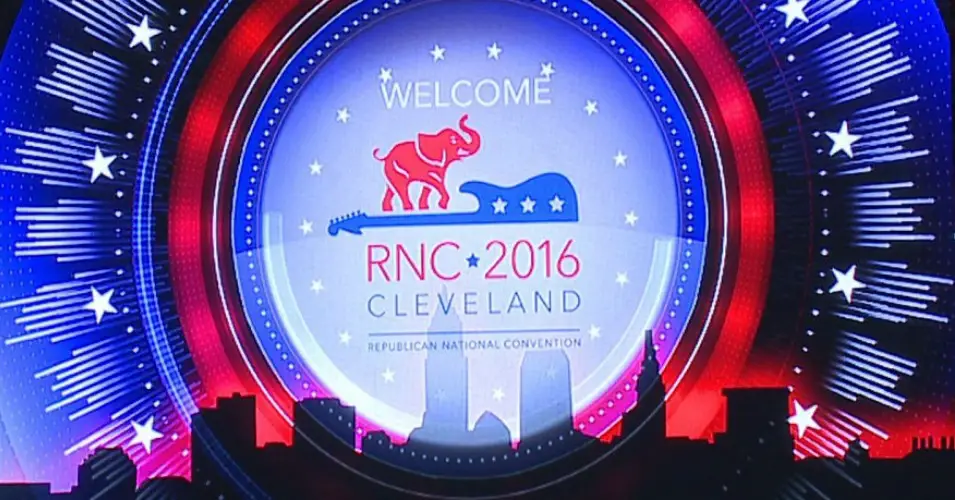All year long, there have been comparisons with this year and 1968. For awhile, the radical Democratic challenger once again looked as if he’d bump off the establishment candidate—only to have the vice president take the nomination. Meanwhile, on the GOP side, Donald Trump has been channeling Richard Nixon, with his talk if the “Silent Majority,” and “Law and Order.”
He spoke Sunday on the issue, as reported by Fortune.
Donald Trump condemned the killings on Sunday of three Louisiana police officers as the fresh spasm of violence put a somber note on the opening of the Republican National Convention due this week to formally nominate him for the White House.
Trump seized on the shooting deaths of the officers in Baton Rouge to bolster his case that he is the better candidate in the Nov. 8 U.S. presidential election to restore law and order than his rival, Democrat Hillary Clinton. . .
Despite a lack of clarity about the motive and specifics of Sunday’s incident, Trump sought to link the violence to the U.S.-led fight against Islamic State, writing: “We are TRYING to fight ISIS, and now our own people are killing our police. Our country is divided and out of control. The world is watching.”
Ironically, it is the Democrats who are pushing the 1968 analogy.
Democratic strategist David Axelrod tweeted that Trump’s effort to make himself a law-and-order candidate reminded him of a similar attempt by Richard Nixon in 1968, when the Republican won his first presidential election.
“Someone’s been studying ’68,” Axelrod tweeted.
For those too young to remember, 1968 was a time of unpopular war, racial upheaval, and dissatisfaction with the status quo. Richard Nixon portrayed himself, literally, as the “Law and Order” candidate, and he beat Democratic Vice President Hubert Humphrey. There was even name-calling, but from the vice presidential candidate, Spiro Agnew, not Nixon, himself. This year, Trump is taking the “bulldog” role, and we assume, Pence will be left to reassure half the public that “he didn’t mean it.”
The comparisons with 1968 fall apart in just about every facet. First, while people, particularly Democrats, are frustrated by war, they don’t blame Obama for starting it, as 1968 Dems blamed LBJ. In fact, the war is not really an issue. There’s no real call to “bring the boys home.” Second, there is racial disorder, but it is very different from 1968. Instead of being a general frustration with a lack of progress toward equality, this year’s anger is specifically related to profiling and police killings. It’s largely localized and focused, not wild, unfocused fury.
But the most important difference between 1968 and this year is that the expected demonstrations and possible violence are aimed at the “Law and Order” party, not Democrats. While Bernie’s fans are still angry, they are not nihilists, as many of Gene McCarthy’s and George McGovern’s fans were in 1968. Reports are that 85% of them are “settling” for Hillary Clinton, already. The Democratic convention may seem orderly, for once, especially coming one week after what could look like chaos.
So it will be up to the Republicans to respond to this year’s protests. RealClearPolitics says that could actually be an opportunity for them.
• Does this convention project competence or chaos, and what is the implication of that?
This is partially out of the hands of Mr. Trump and Republican convention organizers, as the 1968 riots at the Democratic National Convention proved. But Mr. Trump and the GOP will pay for, or benefit from, the answer to this question.
That’s because, in recent decades, the Republicans of Ronald Reagan and George H.W. Bush emerged as contenders for, if not the claimants of, the title that once was the exclusive province of the Democratic Party: the natural party of governance.
The Democrats’ possession of that title was eroded substantially by the chaos of Chicago in 1968.
In Cleveland this week, every hit from a billy club, every canister of tear gas, every bullet would undermine the claim the Republicans have fought so fiercely to defend. The party that won power in 1968 on a law-and-order plank desperately requires law and order at its own convention nearly a half-century later. Indeed, last Monday, Mr. Trump, responding to police shootings and shootings of police officers, declared, “I am the law-and-order candidate.”
Law and order — but not so much that the party is vulnerable to the Ribicoff critique.
The Ribicoff critique? The reference is to Sen. Abraham Ribicoff, Democrat of Connecticut, remembered for his speech nominating Sen. George S. McGovern for president in 1968, four years before the South Dakota Democrat actually would win that nomination. “With George McGovern as president of the United States,” Mr. Ribicoff said, to the disgust of Chicago Mayor Richard J. Daley, “we wouldn’t have to have Gestapo tactics in the streets of Chicago.”
Regardless of speeches and balloons and whatever other fun-and-games Trump has planned for the GOP convention this week, the real message people may take away is how they responded to the reactions of Trump, et al, to protestors. Will they be seen as competent and in control? Could they possibly even defuse the situation?? Or will they come off as angrily flailing around, impotent victims of unfairness? We’ll know by next weekend.
Donate Now to Support Election Central
- Help defend independent journalism
- Directly support this website and our efforts
